|
|
|
Sort Order |
|
|
|
Items / Page
|
|
|
|
|
|
|
| Srl | Item |
| 1 |
ID:
119664
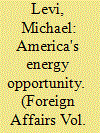

|
|
|
|
|
| Publication |
2013.
|
| Summary/Abstract |
The U.S. energy revolution is not confined to a single fuel or technology: oil and gas production, renewable energy, and fuel-efficient automobile technologies all show great promise. To best position the country for the future, U.S. leaders should capitalize on all these opportunities rather than pick a favorite; the answer lies in 'most of the above.'
|
|
|
|
|
|
|
|
|
|
|
|
|
|
|
|
| 2 |
ID:
132327
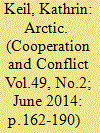

|
|
|
|
|
| Publication |
2014.
|
| Summary/Abstract |
Neorealist and neoliberal institutionalist explanations for the state and future of the Arctic region dominate the Arctic debate in international relations. While both schools focus on different aspects concerning the current and future state of Arctic affairs - neorealism evokes a confrontational rush for the Arctic's resources, whereas neoliberal institutionalism propagates the necessary reform of the institutional system governing Arctic issues - both share the underlying assumption of significant and rising stakes towards Arctic commodities. However, this article argues that this debate has hitherto failed to substantiate the actual stakes of the main actors involved. Consequently, many studies make grandiloquent statements about prospects of cooperation and conflict and the appropriate institutional framework for the Arctic region, based on only limited empirical support. This article aims to fill this gap by analysing the Arctic oil and gas interests of the five Arctic littoral states (Russia, USA, Canada, Norway and Denmark/Greenland). The analysis shows greatly different levels of interests towards the High North among the Arctic states. The findings make it possible to make more credible statements about the likelihood of confrontation over Arctic resources and necessary institutional adjustments. The evidence shows that the often-evoked issue of geopolitical rush for Arctic resources is unlikely to eventuate. Nonetheless, there remain institutional challenges for the protection of the fragile Arctic ecosystem.
|
|
|
|
|
|
|
|
|
|
|
|
|
|
|
|
| 3 |
ID:
119857
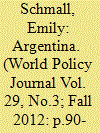

|
|
|
|
|
| Publication |
2012.
|
| Summary/Abstract |
Chubut, Argentina-In mid-June, at the onset of winter in the Southern Hemisphere, a gang of burly, masked construction workers took over Cerro Dragón, an oil and gas field 15 times the size of Buenos Aires and Argentina's most important source of hydrocarbons. Some 500 members of a union nicknamed the Dragons wrecked offices, spray-painted seditious messages on buildings, and barricaded access routes with torched cars in a scene Pan American Energy's chief executive Oscar Prieto compared to battle-scarred Baghdad. The disarray forced Pan American-majority-owned by oil giant BP, with China's CNOOC holding a 20 percent share-to halt production in the field for the first time in its more than 50 years of operations. The threat was calculated to irk a government already spending heavily on imported energy and that has demonstrated its willingness to take over companies.
|
|
|
|
|
|
|
|
|
|
|
|
|
|
|
|
| 4 |
ID:
118773
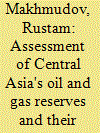

|
|
|
| 5 |
ID:
100617
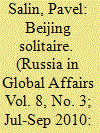

|
|
|
| 6 |
ID:
188471
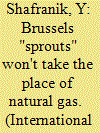

|
|
|
|
|
| Summary/Abstract |
DREAMS of a rapidly dawning age of carbon-free energy are not yet lost in Europe. But today, in anticipation of the inevitable cold, this topic has been put on the back burner. The German government has voiced concern that a shortage of gas this winter could lead to crisis in regions across Germany. Meanwhile, in France, heads of industry have serious concerns about the rising cost of gas. They are not ruling out the most grievous consequences, including a total collapse of industry.
|
|
|
|
|
|
|
|
|
|
|
|
|
|
|
|
| 7 |
ID:
132382
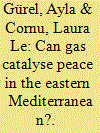

|
|
|
|
|
| Publication |
2014.
|
| Summary/Abstract |
The economic rationale for energy collaboration between Turkey, Cyprus and Israel is compelling. Cyprus and Israel need commercially viable export routes for their gas while Turkey is eager to diversify and increase its gas supplies. Hydrocarbon resources could potentially be a catalyst for both bringing about a Cyprus settlement and a Turkey-Israel rapprochement. A trilateral cooperation scheme involving a Turkey-Israel pipeline and an LNG plant in Cyprus could offer strong commercial incentives to all parties. But it would require bold political vision on the part of the region's leaders, coupled with backing from influential external actors with an interest in reconciliation and stability in the Eastern Mediterranean.
|
|
|
|
|
|
|
|
|
|
|
|
|
|
|
|
| 8 |
ID:
146066


|
|
|
|
|
| Summary/Abstract |
According to BP statistics, Iran has the world's largest reserves of natural gas and its fourth-largest reserves of oil. Its strategic geographic position makes it capable of supplying these resources to Europe, its Middle Eastern neighbors, and South and East Asian countries.1 Yet, the difficult geopolitical situation around its nuclear program and the poor management of its energy industry have prevented it from becoming a gas exporter to the European Union (EU).
|
|
|
|
|
|
|
|
|
|
|
|
|
|
|
|
| 9 |
ID:
125514
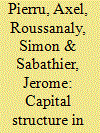

|
|
|
|
|
| Publication |
2013.
|
| Summary/Abstract |
This paper provides new empirical insights on the capital structure of project-financed LNG infrastructures and gas pipeline projects, by using data relating to projects whose financial close occurred between June 2004 and March 2011. Most results are consistent with the basic view of risk-averse funds suppliers. Especially, the projects located in risky countries and larger projects tend to exhibit lower debt ratios and less-concentrated equity ownerships. In addition, regasification projects appear to have a more diluted equity ownership. Methodological issues raised by the financing of these projects are also examined from a capital-budgeting perspective. In particular, the equity residual method, usually used by industrial practitioners to value these projects, should be adjusted.
|
|
|
|
|
|
|
|
|
|
|
|
|
|
|
|
| 10 |
ID:
106526
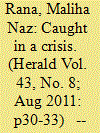

|
|
|
| 11 |
ID:
133182
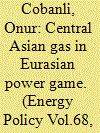

|
|
|
|
|
| Publication |
2014.
|
| Summary/Abstract |
Following the dissolution of the Soviet Union, various gas pipeline projects have been proposed to diversify transit routes and export markets of the landlocked Central Asian states. To evaluate the pipeline project's impact on the players' bargaining power, I apply the cooperate game theory to a quantitative model of the Eurasian gas trade and quantify the bargaining power structure via the Shapley value. Due to ample production capacities in Central Asia, I observe little strategic interaction between the West and China. Thus, demand competition with China is not necessarily a disadvantage for the West, and the Turkmenistan-China pipeline does not affect the impact of the westbound projects aiming Europe and Turkey. For Turkmenistan, i.e., the main supplier in the region, a link via the Caspian Sea to Turkey is the most beneficial westbound option. Although the projects carrying gas from Azerbaijan and Turkmenistan to Europe enjoy the European Commission's political support, they yield marginal benefits to the European consumers. Thanks to its transit position, Turkey collects a large share of the benefits in the East-West gas trade.
|
|
|
|
|
|
|
|
|
|
|
|
|
|
|
|
| 12 |
ID:
123730
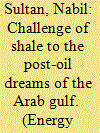

|
|
|
|
|
| Publication |
2013.
|
| Summary/Abstract |
Growth patterns in the Gulf Cooperation Council (GCC) countries suggest that demand for energy in this region is likely to increase in the years to come and this situation ultimately means that more of the region's natural resources will need to be devoted to meeting this demand. For some of the GCC countries, the option to meet future power demands through alternative sources of energy such as nuclear power was deemed an attractive proposition.
Furthermore, real investments and plans to use other alternative energy sources such as solar, wind, hydrogen and geothermal are also gaining momentum in the region. However, relatively recent developments in the technology used for extracting gas and oil from shale rock formations places a big question mark on the GCC countries' energy plans including those relating to alternative and renewable sources of energy.
This article examines the GCC's new energy drive and explores the economic and political motivations behind it. Furthermore, the article also examines the potential impact of shale gas and oil extraction on this region's abundant fossil-based resources and the ramifications of such impact (if it materialises) for the GCC countries' alternative energy plans, future wealth and their political stability.
|
|
|
|
|
|
|
|
|
|
|
|
|
|
|
|
| 13 |
ID:
149848
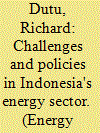

|
|
|
|
|
| Summary/Abstract |
Fossil fuels are central to Indonesia's energy policy, and its main source of export revenues. However, insufficient investment, the lack of transport infrastructure and an unwieldy regulatory environment are inhibiting the sector from reaching its full potential. Looking ahead, growing environmental concerns combined with sharp falls in coal prices and the on-going shale gas revolution call into question the sustainability of an energy strategy based almost exclusively on fossil fuels. This viewpoint challenges Indonesia's current energy policy and proposes ways to increase its energy efficiency and use of renewables. In particular, its gas sector should be further developed to plug the gap until sufficient renewable energy, especially geothermal, comes on line. Government control over the oil industry via state-owned Pertamina should be gradually reduced. Clarifying, streamlining and publicising simple regulations in energy, especially regarding land rights and on-shore processing, and removing foreign-ownership restrictions will help bring much needed investment. The pressure on the environment of natural resource exploitation should also be addressed by properly defining property rights and regulations regarding forest land, and implementing a positive implicit carbon price.
|
|
|
|
|
|
|
|
|
|
|
|
|
|
|
|
| 14 |
ID:
143042
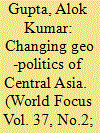

|
|
|
|
|
| Summary/Abstract |
Conflict shall neither serve the purpose of East nor even of the west, but obviously it may serve the purpose of terrorist organizations and all at the cost of severe human rights violations of the common and innocent citizens of the Central Asian region. Hence, oil, gas, geopolitics and terrorism create rigmarole.
|
|
|
|
|
|
|
|
|
|
|
|
|
|
|
|
| 15 |
ID:
123658
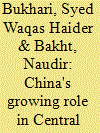

|
|
|
| 16 |
ID:
092737


|
|
|
|
|
| Publication |
2009.
|
| Summary/Abstract |
The Fourth Assessment Report of IPCC reports that greenhouse gas emissions can be reduced by about 30-50% in 2030 at costs below 100 US$/tCO2 based on an assessment of both bottom-up and top-down studies. Here, we have looked in more detail into the outcomes of specific models and also analyzed the economic potentials at the sectoral and regional level. At the aggregated level, the findings of the IPCC report are confirmed. However, substantial differences are found at the sectoral level. At the same time, there seems to be no systematic difference in the reduction potential reported by top-down and bottom-up approaches. The largest reduction potential as a response to carbon prices exists in the energy supply sector. Reduction potential in the building sector may carry relatively low costs. Although uncertainties are considerable, the modeling results and the bottom-up analyses all suggest that at the global level around 50% of greenhouse gas emissions may be reduced at carbon price (costs) below 100$/tCO2-eq-but with a wide range of 30-60%. At a carbon price (costs) less than 20$/tCO2-eq, still 10-35% of emissions may be abated. The variation of results is higher at low carbon-price levels than at high levels.
|
|
|
|
|
|
|
|
|
|
|
|
|
|
|
|
| 17 |
ID:
176648


|
|
|
|
|
| Summary/Abstract |
The incorporation of the Internet of Things (IoT) technologies enables products with new features, thus turning them into “smart products.” One of the opportunities presented by the literature for these applications is the development of household smart meters. In spite of this, few studies in this area seek to understand the most appropriate configurations of smart meters to meet customer needs. With this in mind, the objective of this work is to identify the most appropriate configuration for a smart household meter for electricity, water, and gas consumption, which adds value for a different household customer. Therefore, a market research based on Conjoint Analysis Based on Choice was carried out. The survey presents a sample of 202 respondents restricted to the metropolitan area of Florianópolis, in southern Brazil. The results indicate the relevance given by sample consumers to energy and water control, but no significant interest in controlling gas consumption. Consumers are also interested in using the mobile application to access information and tips on the consumption of monitored resources. Moreover, respondents in this region are less price sensitive. However, women and consumers of cheaper real estate are more willing to pay a higher price for a smart meter.
|
|
|
|
|
|
|
|
|
|
|
|
|
|
|
|
| 18 |
ID:
109780
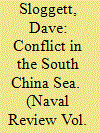

|
|
|
| 19 |
ID:
074576


|
|
|
|
|
| Publication |
2006.
|
| Summary/Abstract |
The recent Russian-Ukrainian gas dispute underlined the necessity of energy market reform in Europe. The gas market has turned out to be the main concern for Europe as it is pipeline bound and demands long and stable relationships between the producer, the consumer and the transit country. Over-dependence on any one specific infrastructure (pipeline), as much as over-dependence on any single producer are bound to create future problems. To avoid future repetitions of the Russian-Ukrainian crisis, the European Union should support the free evolution of market prices, as well as push Russia to firm and ratify the dispute-settlement tool, the Energy Charter Treaty, and diversify gas import routes.
|
|
|
|
|
|
|
|
|
|
|
|
|
|
|
|
| 20 |
ID:
129254


|
|
|
|
|
|
|
|